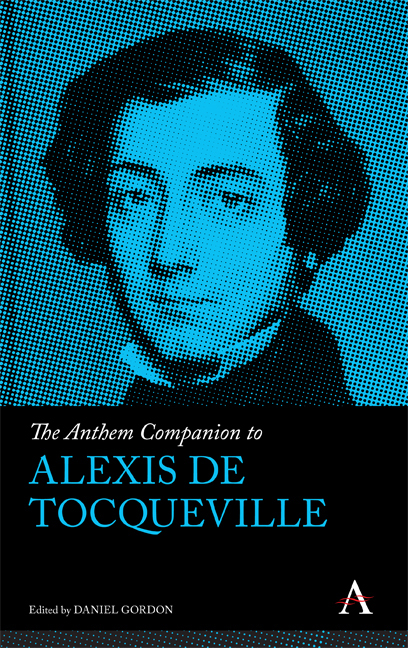Book contents
- Frontmatter
- Contents
- Introduction: Tocqueville and the Sociological Conversation
- A Note on References to Democracy in America
- Part 1 Religion And Immaterial Interests
- Chapter 1 Tocqueville on Religion
- Chapter 2 Unmasking Religion: Marx's Stance, Tocqueville's Alternative
- Part 2 Language, Literature, and Social Theory
- Part 3 Globalism and Empire
- Part 4 Inequalities Inside Democracy
- Part 5 Citizenship, Participation, and Punishment
- Part 6 An Unfinished Project
- Notes on Contributors
- Index
Chapter 2 - Unmasking Religion: Marx's Stance, Tocqueville's Alternative
from Part 1 - Religion And Immaterial Interests
Published online by Cambridge University Press: 12 July 2019
- Frontmatter
- Contents
- Introduction: Tocqueville and the Sociological Conversation
- A Note on References to Democracy in America
- Part 1 Religion And Immaterial Interests
- Chapter 1 Tocqueville on Religion
- Chapter 2 Unmasking Religion: Marx's Stance, Tocqueville's Alternative
- Part 2 Language, Literature, and Social Theory
- Part 3 Globalism and Empire
- Part 4 Inequalities Inside Democracy
- Part 5 Citizenship, Participation, and Punishment
- Part 6 An Unfinished Project
- Notes on Contributors
- Index
Summary
I stop the first American I meet, either in his own country or elsewhere, and I ask him whether he thinks religion is useful to the stability and good order in society. He answers without hesitation that a civilized society, especially a free one, cannot last without religion. Respect for religion, in his eyes, is the greatest guarantee of the state and of the security of individuals […] However, there is no country in the world where the boldest political doctrines of the eighteenth-century philosophers were more applied than in America; only their antireligious doctrines have never managed to surface, even with the advantage of an unlimited freedom of the press.
Alexis de Tocqueville (The Ancien Régime and the Revolution, [1856] 2008, 154)When theorists who lack a religious faith examine religious life, are they bound by some logical necessity to unmask it? Karl Marx and the Young Hegelians seem to have thought so. By their lights, religion is an inversion of human powers and possibilities. Marx is interested neither in the social contingencies of religion nor in the religious experience of different societies. Indeed, the very concept of religious experience is meaningless for him. Since there is no God, a religious experience is no more than a benighted expression of something nonreligious: the domination of one group over another. As we shall see, Marx's unmasking of religion is abstract and apodictic. It fell, later, to Engels to sketch a materialist history of Christianity (“this religion of nonsense”) from its origins to modern times, just as it fell to him to flesh out a materialistic theory of consciousness.
Alexis de Tocqueville's approach to religion is the antipode of Marx and Engels’. A man of unconventional faith, Tocqueville takes religion seriously, considers it in comparative perspective, and charts its myriad social and political effects. If religious practice may oppress human beings in some contexts, he says, it may help liberate them in others.
We do not know if Tocqueville read Marx, but we do know that Marx read Tocqueville. Both Tocqueville and his friend and collaborator, Gustave de Beaumont, are mentioned in “On the Jewish Question” for their view of North America as “the land of religiosity par excellence” (Marx [1843] 1975a, 217).
- Type
- Chapter
- Information
- The Anthem Companion to Alexis de Tocqueville , pp. 21 - 42Publisher: Anthem PressPrint publication year: 2019



